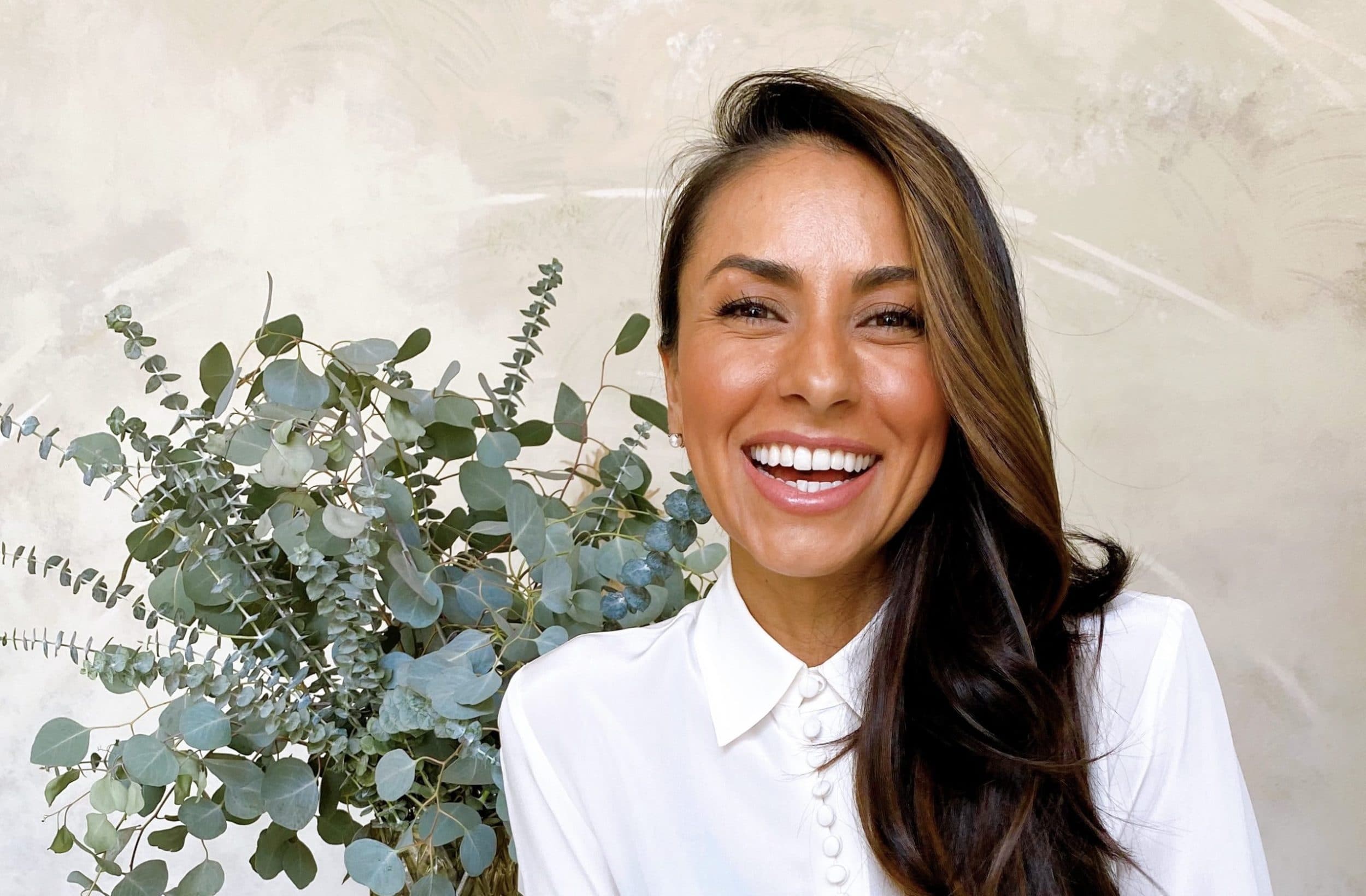Sivananda Bahamas Blog
Expand Your Horizons …
Our Blog
Yoga, Nutrition, and the Ashram Experience: An Interview with Mona Sharma
Transform your body and mind; reserve your spot today for Mona Sharma's 4-day nutrition retreat. The program, titled Healing and Happiness: A Nutritional Blueprint to Optimize Your Health will take place March 24 - 27, 2022. There is still time to register to take the course ON-SITE on beautiful Paradise Island, Bahamas and ONLINE from the comfort of your home.
Mona Sharma is a renowned celebrity holistic nutritionist and wellness educator. She was recently featured on the Facebook series Red Table Talk regarding her health and wellness work with Will Smith and her contributions to the entire Smith family's healing journey.
 Mona Sharma's father with Swami Vishnudevananda.
Mona Sharma's father with Swami Vishnudevananda.
Omkari: You've been apart of the Sivananda community since you were a child. How did your family get involved?
Mona: My mom was looking for support for my father. He was an Indian immigrant in Canada and in the corporate world. At that time, there wasn't a lot of representation of his faith and his culture. Some people mentioned a center in Montreal. My mom got their name and their information and then my dad ended up going [to Sivananda Ashram Yoga Camp in Val-Morin, Quebec, Canada]. He was going to stay there for a few days but ended up staying much longer. The next time he went he brought his sisters and his brothers and after that, [going up to the ashram in Val-Mornin] turned into a family ritual. All of us, the entire family, all of my little cousins, we would go up during the summer months. [The ashram is] on a mountain, so we would do a lot of playing and picking berries. Swami Vishnu had an airplane there, we were always peeking inside of it.
Omkari: What made you and your family keep coming back to the ashram year after year?
Mona: My dad recognized that the ashram was a really big part of his healing and that feeling transferred to my mom and eventually to me. I was in my mom's stomach when I was at the ashram for the first time. My dad has always said to me: you were in your mother's stomach at the ashram, the vibration of the ashram is what stuck with you. Now that I'm older, I'm also excited to take my kids one day. Because it truly is this all-pervading vibration. It's the sort of vibration that just stays with you.
Omkari: It felt like a big family vacation? Even with the 5:30 AM wake-up?
Mona: Of course, gosh, you know, who really loves arriving to the ashram and having to wake up at 5:30 in the morning? You grow to love it, sure, but at first I think it's hard for everyone, it's really challenging. Because we'll always seek comfort first. When we first arrive at the ashram, we don't realize that every single ritual at the ashram is actually designed to make us feel more comfort in the end.
Omkari: How did the ashram help facilitate the process of healing?
Mona: For my dad, I think it was the space for solitude. My mom, she suffers from rheumatoid arthritis. She would always arrive in pain. After leaving the ashram, her entire being was uplifted. Practicing yoga outside on a beautiful platform surrounded by nature everyday, it really made a huge difference. I feel that the change I witnessed in my parents yearly, the memory of it really imprinted on me.
Omkari: Last time we spoke you mentioned that the ashram saved you during a very dark time in your life. Mostly due to this imprinting. Can you talk a little bit more about that?
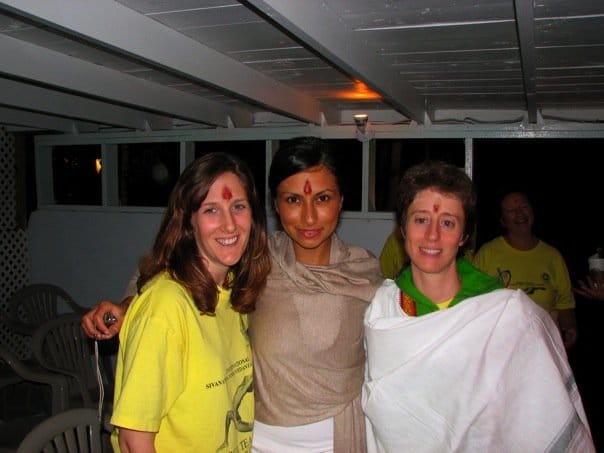
Mona Sharma during one of her visits to the Sivananda Ashram Yoga Retreat on Paradise Island, Bahamas.
Mona: Yes, definitely. During this dark period of my life, I was getting my second heart surgery. The image of my heart was on a monitor on this massive screen. I was awake for the whole thing, the doctors were pumping my body with adrenaline to get my heart rate up, to induce heart palpitations. I was suffering a lot at the time, nothing had worked, no treatment, and I remember laying there as they were pumping me full of adrenaline, I remember watching my heart on the monitor and thinking: what did I do to get to this point? I'm, you know, I'm only 23 years old. I'm healthy. My mom has suffered her entire life from this disease. I know of yoga, I know about meditation. And then the doctors say: Mona, if we go through with the surgery, you might have to wear a pacemaker for the rest of your life. That was when I decided: no more; that's it. This is not my life. This is not my health, I know there's a better way. And I knew that I had to get back home, home to my inner self, I had to return to the ashram. I no longer recognized who I was because I identified so much with somebody who was sick, sad, anxious, and stressed. I had forgotten the feeling, the vibration of the ashram. But then I had the memory. And the memory brought me back. So I went back to the ashram. I became a yoga teacher and a meditation teacher. Then a nutritionist. And since then, I've never looked back.
Omkari: How long have you been coming to the ashram?
Mona: 15, 16 years. I would come every February.
Omkari: To the ashram in the Bahamas?
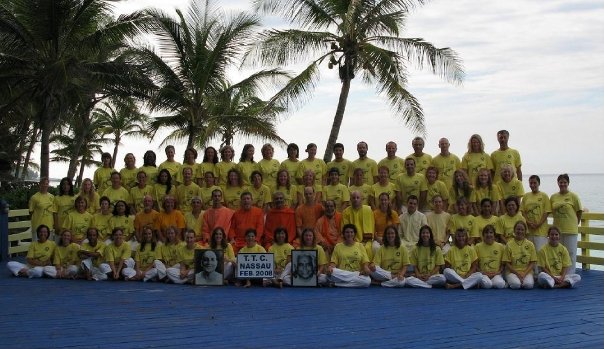
Mona Sharma's graduating TTC class in February of 2008.
Mona: Yes. And I did my TTC [Yoga Teacher Training] there in January and February, the 2nd or 3rd year I started going.
Omkari: Now you're a yoga teacher, a meditation teacher, a nutritionist, as you've mentioned. You've worked with Will Smith's family. You also help people bring the ashram home?
Mona: Yes, I help them build their own ashram.
Omkari: What does that look like?
Mona: It's setting the stage. For people who don't have the luxury to go to the ashram, I teach them how to set this stage in their own home. At the ashram, everything is set to feel peace, right? I help the individual take stock of their life, both internally and externally. When you look at the scene at the ashram, the music, the food, the high vibration of peace, you can do that in your own home. All it takes is looking around yourself and asking: what brings you joy? What causes you stress? What music are you playing in the background? Is it uplifting? Or is it depleting? What about the foods that you're eating? Is the food nourishing you or depleting you?
The major question I ask all of my clients to ask themselves is, whether it's regarding the foods that they eat, the TV that they're watching, the conversations that they're having, or the activities that they're doing, the question is: Is doing this going to nourish me and take me closer to the version of myself that I want to become? Or is doing this going to make me feel depleted and keep me where I am or make me feel as though I'm still the same person that I'm trying to move away from? Everyone can be the decider of these things in their own life. You can set the stage yourself. You CAN make all the right decisions. You have that power.
Omkari: What's the major difference between the ashram physically and creating an ashram-like atmosphere in your own home?
Mona: At the ashram, you have a community that is physically, emotionally, mentally, spiritually supportive of you. You have an entire roster of activities. At home, the discipline falls on you, it's your mind that gets in the way. You talk yourself out of things. There's always tomorrow. Tomorrow, I'll do this. Tomorrow, I'll do that. It's much easier to fall into this pattern at home.
Omkari: Would you say it's possible to have the ashram mentality and setting anywhere, regardless of if you're in a city, if you're in the mountains, if you have three roommates, if you live alone? What would you recommend to someone who struggles with discipline, who hasn't had the opportunity to come to the ashram, to have a taste of this discipline and its benefits? How do these people incorporate the benefits of ashram living? How do they maintain a schedule? What is your recommendation or prescription there?
Mona: First of all, yes, it's definitely possible. It doesn't matter where you live, how big your space is, if you live alone or with a big family or with roommates. To those who struggle with discipline, who haven't had the opportunity to experience the ashram... and even to those who have, I would say: treat your calendar, your schedule, like your boss, and use it right. If you're seeking this freedom in your life, or what a lot of people call "a flow state", then you have to set the structure, set the paradigms and set the boundaries so that you have something to follow every single day. We can all wake up at 5:30 or six o'clock every day, we can all do that. We can all choose to eat healthy foods. We can all turn on whatever app you have, you know, we can all play Sivananda kirtan in the morning if we wanted to replicate a morning satsang, right? We all have the choice to listen to uplifting music. We are masters of our moods. You have to treat your calendar like it's your boss and hold yourself to that number one position of accountability. And the second things happen? Because things will happen, that's just life, right? To be gentle with yourself, to live in grace.
People always say, "Oh, I fell off the wagon. You know, and I've got to get back on." My response is: "There's no wagon in life. It's just, you had a day. And tomorrow's a new day. And you get to choose how you want to be tomorrow." Or in this moment. Right? I can choose for today. We always have the ability to say: "You know what, I don't feel so great. I'm gonna let myself off the hook. I'm gonna have a doughnut and skip my workout and not do my mindfulness exercises today." When this happens, you have to ask yourself: Is letting myself off the hook, having a doughnut, skipping my workout, not doing mindfulness, is that a version of love for yourself? Are you showing yourself love by making those decisions? We're not, we're not showing ourselves love [when making those sorts of decisions], not really. And this is where the deeper work comes in. This is where we have to uncover a lot of the emotional health that was instilled within us when we were younger. Whether it was lack of love, if there was trauma surrounding not being good enough, being told that doing something had to be hard, that it has to be so hard to get there when it doesn't. Because everything can happen with grace. You just have to adopt the mindfulness and the vibration in your life to live in that grace.
Omkari: What is the biggest misconception you've run into regarding the ashram experience?
Mona: A lot of people think that ashram life is religious. That it's exclusively about religion, following God and spirit, singing to Gods, stuff like that. And although that's a big component of ashram living, I think that in today's society, we now have an understanding that there's this idea of consciousness and oneness that all of us feel. And this idea is helping us open up to understanding the the ashram isn't religious, it's spiritual; the ashram exists in a realm that is open to all faiths and people of all backgrounds, all ages, all genders, all races.
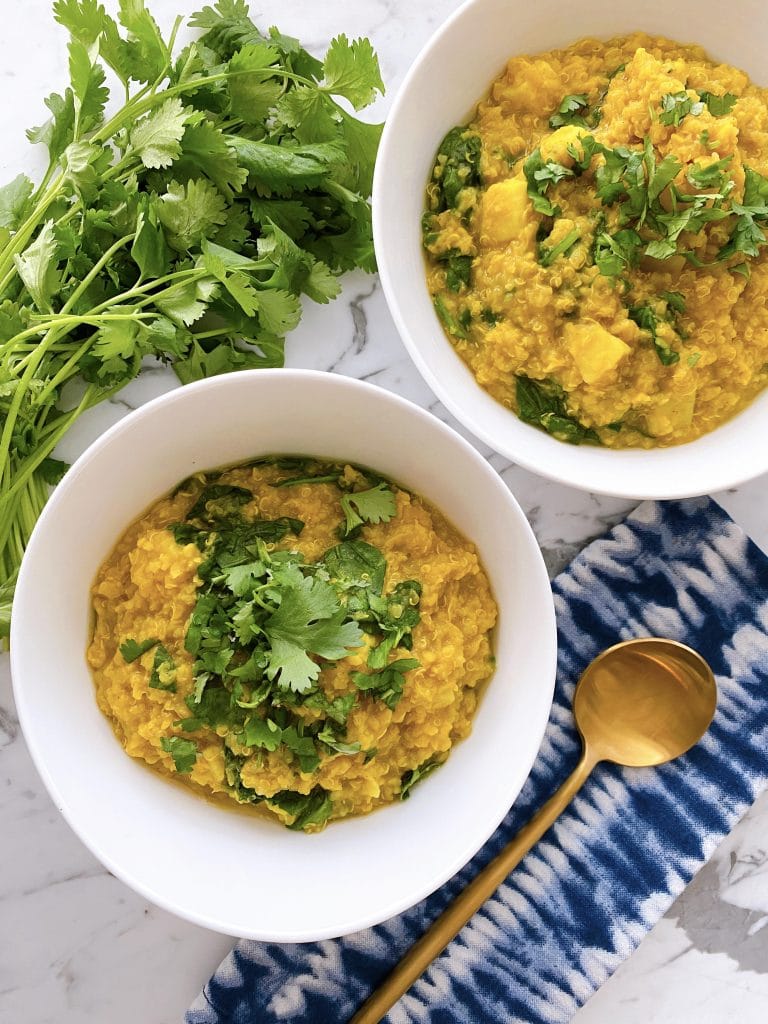 One of Mona Sharma's delicious kitchari recipes featured in her upcoming program.
One of Mona Sharma's delicious kitchari recipes featured in her upcoming program.
Omkari: What are your 3 big take aways from ashram living?
Mona: One, to really recognize that food is medicine. It's not like medicine, food is medicine. Everything that you consume is going to either fuel your health and your happiness or it's going to fuel inflammation and disease. That's number one. Number two, moving in ways that help your body open, enjoy, and experience freedom. There's power in doing yoga specifically because as we move into certain postures, we bring opening and expansion in the areas that are closed. When we do yoga, bringing expansion to the areas that feel restricted allows people to experience freedom and relief. And then the third thing I would say is mindfulness. The power of our mind, the ability to find stillness amidst the chaos, is important now more than ever. And, you know, we have to stop calling these things woo-woo because they are in fact, all backed by science. We're finally getting to a point, thank God, where doctors are recognizing the power of these practices and saying, "Hey, you should probably start meditating for a few minutes a day." We are finally starting to see the availability of these resources, these toolkits, meditation classes in schools for children. I can't wait for the day when that's a primary focus. Imagine starting our days off collectively from that state together. Just think about the impact that would make on our physiology, our mental health and our emotional well being throughout the day.
Omkari: How do we support each other in making these tools more readily available for everyone, in making that future of starting our days off collectively meditating a reality?
Mona: We have to have more conversations, reminding each other that [that future] is coming because the fact of the matter is, we are living in an era of unprecedented change and unprecedented hyperawareness of our bodies, our food intakes, everything. There is so much out there concerning diets and what to do, fads and workout programs, it's overwhelming. Even experts are confused. And the point is that, all of these diets, fads, workout programs, none of it is working. Diabetes is on the rise, obesity is on the rise with adults and children. And none of these diets, fads, workout programs are treating the root cause of the problem, the disturbance in the consciousness. So there needs to be a reset. We need an Ultimate Reset. Practices like yoga, meditation, and mindful eating help us recognize that we're still really stressed, we're even more stressed when we take drastic measures. The more gentle practices of yoga, meditation, and mindfulness bring us back into balance and help us ask the question that really matters: why don't we find a little bit more softness and grace for ourselves? Tune in to the healing and the experience of feeling better. And then notice how the body reacts to that.
Omkari: What are the biggest differences between Sivananda yoga and other types of yoga commercially available in the Western world?
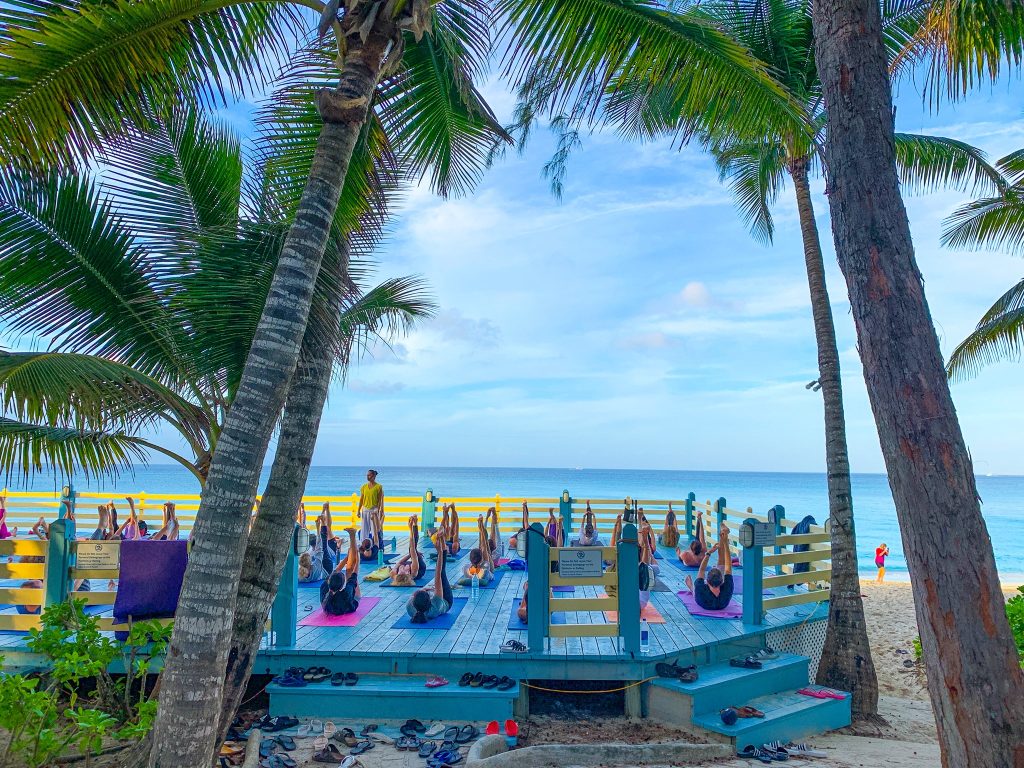 Mona Sharma teaching yoga on the beach platform at Sivananda Ashram Yoga Retreat on Paradise Island, Bahamas.
Mona Sharma teaching yoga on the beach platform at Sivananda Ashram Yoga Retreat on Paradise Island, Bahamas.
Mona: I would say the biggest difference between the Sivananda approach and other approaches, well, first of all, it is of course the time. We have longer yoga classes [at Sivananda], but we do so for a reason. In a Sivananda class we incorporate so much more rest and stillness, we really acknowledge the power of rest and relaxation and what rest and relaxation do for our physiology. Just seeing somebody before a Sivananda yoga class and then looking at their face again at the end, my gosh, it's like they aged backwards at least 5 years, right? Their face look brighter, they look more at peace, you can feel that sense of ease coming off of them.
Omkari: Why should people explore the benefits of Sivananda yoga and treating food as medicine through your program Healing and Happiness: A Nutritional Blueprint to Optimize Your Health?
Mona: Let's put it this way. People will hire me to do a headstand or a handstand or get a six pack. But people will stay with me because I help them change their state and experience emotional freedom. While there's a time a place for really high energy workouts, workouts that might fuel you and your energy throughout the day, it's important to honor stillness, slowness and to cultivate the understanding of that thought, "today I need more stillness, more slowness." [By enrolling and participating in the program] we ask questions like: What are the lessons from practicing a slower yoga practice, for holding the asanas longer? What are the gifts in stopping and doing Sivasana [or corpse pose]? Before and after class and in between poses? What do practices like these do for my mental state? My peace of mind?
Omkari: Is there a resistance to the slowing down, to enjoying the stillness and mindfulness present in programs like yours and in Sivananda yoga classes generally?
Mona: The hardest part is that thought, "I'm not, I'm not using my time wisely. This isn't gonna help me get my six pack, this isn't gonna help me get to the number on the scale." Of course, instead we need to be recognizing that it actually is helping, that instead of just tightening and just losing weight you're doing all of that and you might actually be helping your body age backwards. We now know that our biological age can be very different from our chronological age based on the decisions, the actions that we take every single day. And I would say that that's the beauty of Sivananda yoga. [Sivananda yoga] enables us to experience rest and digest, which is the opposite of fight or flight.
Omkari: In your program, people will be learning how to take the ashram home with them. What is one of the key things you recommend to those interested in building an ashram in their own home?
Mona: The number one thing on my list when I'm teaching how to build your own ashram is to build an altar in your home. The altar does not have to be religious, it could be pictures of your family, it can be a picture of yourself at the most happy time in your life, it could be a picture of anything that brings you peace, it could be a special stone. Whatever it is, it should be something that is of value to you. Something that's your anchor, when you see it every day it anchors you in the present. And it anchors you to the feeling and the emotion that you deserve to feel. Simply having an altar is step one to bring you into a practice. We all say, "Oh, well, I don't have the temple to go to, it was different at the ashram because I got to go to a temple and [the temple] set the stage." My solution is: you set the stage by having an altar. You make it your sacred space and every day it brings you back to your practice.
Omkari: Any last words for those reading about the ashram, your program, and Sivananda yoga?
Mona: The ashram feels great. Eating well feels great. Doing yoga on an open beach platform feels great. I love it. It's beautiful. [Sivananda Ashram Yoga Retreat in The Bahamas is] a powerful place. I always say to everyone: look, I understand. [Going to an ashram] might be completely out of your realm. But give yourself a few days [at the ashram], just let the experience sit with you. You don't need to judge it and you don't need to take anything home that doesn't serve you, doesn't work for you. Just come and be open so that you can carry what helps you out into the world. Everyone always leaves [the ashram] with something specific, everyone learns a feeling that they experience or practice that they can then take with them. It's magic. [The ashram] is pure magic.
Transform your body and mind; reserve your spot today for Mona Sharma's 4-day nutrition retreat. The program, titled Healing and Happiness: A Nutritional Blueprint to Optimize Your Health will take place March 24 - 27, 2022. There is still time to register to take the course ON-SITE on beautiful Paradise Island, Bahamas and ONLINE from the comfort of your home.
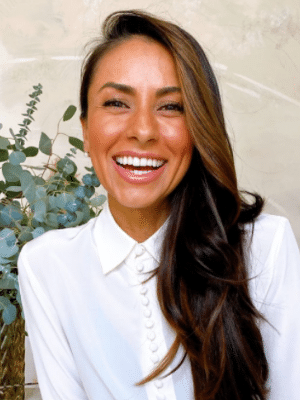
Mona Sharma is a renowned celebrity nutritionist and global speaker guiding clients like Will Smith, Jay Shetty, Julianne Hough, and Hrithik Roshan. With recurring appearances on The Today Show, The Doctor’s Television, and Red Table Talk, her expertise is widely recognized. Mona also hosts the #1 rated podcast, Rooted In Wellness™, which focuses on aligning wisdom of ancient healing practices and modern scientific research, empowering listeners to heal and thrive in today’s world.
As a passionate wellness advocate, Mona believes that optimizing health and longevity requires an integrative approach that blends ancient healing practices with modern medicine. Her personal journey of recovery from two heart surgeries rekindled her connection to her upbringing living on an Ashram, Ayurveda and yogic roots. Mona’s passion for healing our food system and highlighting the body’s innate intelligence has lead her to dedicate her life to transforming lives and fostering a healthier, more vibrant world, inside and out.
Upcoming Courses
Come embark on a journey of self-discovery and healing, guided by Mona Sharma’s expertise and the timeless wisdom of ancient practices. This course will empower you to take control of your health, turn on your body’s natural healing abilities, and live with more energy, vitality, and joy.



